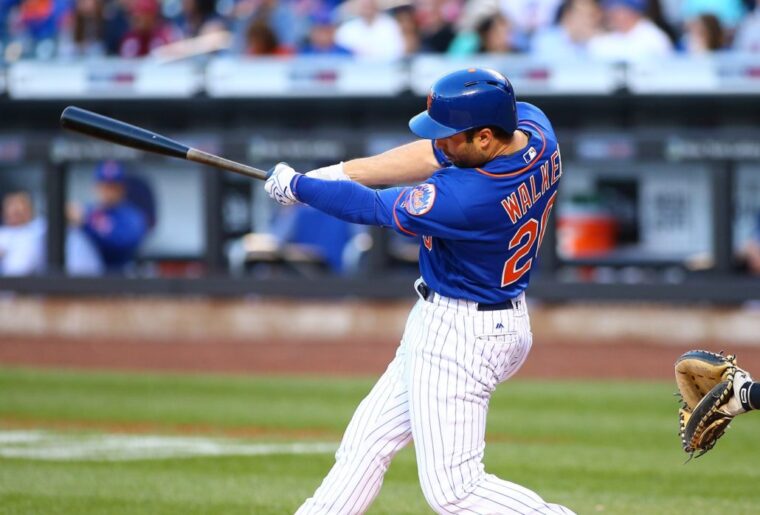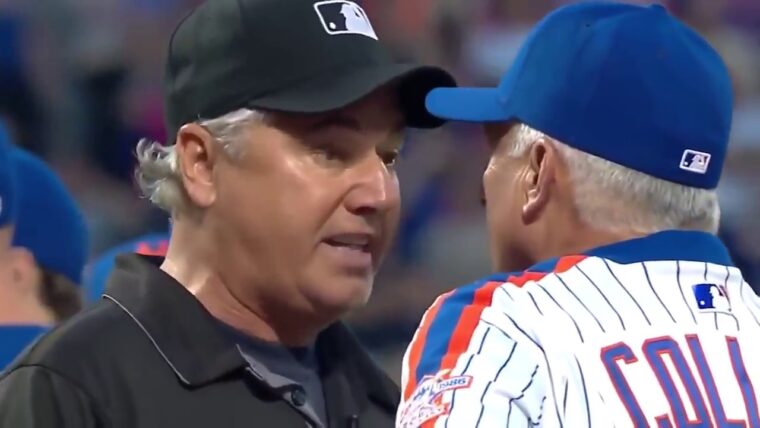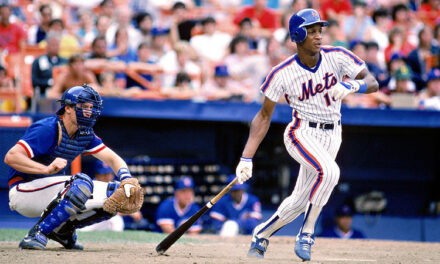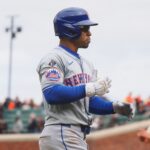
Neil Walker, who played in over 1,300 major league games with six different organizations from 2009 through 2020, hopes that one word will accurately sum up his professional career which came to an end when he announced his retirement in April of this year: Grinder.
Growing up in the Pittsburgh area idolizing many of the players from the nineties Pirates teams, Walker dreamed of one day putting on the Pirates’ uniform and being a hometown favorite amongst the fans. With a blue-collar work ethic and a family that had major league experience (his father, Tom, was a pitcher for six years; his uncle, Chip Lang, made 30 appearances for the Montreal Expos), Walker’s dream came true when the Pirates drafted him with their first overall pick (11th overall) in the 2004 MLB Draft.
Drafted as a switch-hitting catcher, Walker found himself changing positions throughout his minor league tenure as needs arose for the major league club. By the time he reached the majors, the Pirates were in need of a second baseman, a position Walker had only played 21 games at in the minor leagues. Walker admits being nervous at second during his 2010 rookie season, though, he got more and more comfortable at the position after eight-time Gold Glove winner and Hall of Fame second baseman Bill Mazeroski worked with him in spring training in 2011.
While Walker’s defensive game was a work in progress, he regularly excelled on offense. Among qualified second basemen from 2010 to 2015, Walker hit the fifth-most home runs (93), and recorded the fifth-highest wRC+ (115), while posting the eighth-highest fWAR (15.8).
After spending the first seven seasons with the Pirates, Walker was dealt to the New York Mets in December of 2015 for left-handed pitcher Jon Niese. Walker got off to a terrific start with his new club, hitting nine home runs and posting a .962 OPS in the first month with the Mets in 2016. He became just the fourth different Mets player to hit nine or more homers in a single month for the club since 2010, joining Yoenis Céspedes (September 2015), John Buck (April 2013), and Ike Davis (July 2012).
Walker played in a total of 186 games for the Mets from 2016 until August 12, 2017, when he was dealt to the Milwaukee Brewers for a player to be named later (Eric Hanhold). During his time with the Mets, Walker slashed .275/.344/.462 with a 116 OPS+.
Following his retirement announcement, Walker, 36, worked as a color analyst for Pirates’ broadcasts late in the 2021 season. Walker emphasized how much he’d like to remain in the game, with broadcasting or working in player development as two areas he identified in particular.
The Pittsburgh-native who worked tirelessly to help a struggling Pirates organization get back to the postseason and remained steadfast in being a team player hopes that what he learned from his professional career can help resonate with the future talent of the sport.
All non-grinders need not apply.
I had the privilege of speaking to Walker over the summer to talk about growing up in the game, switching positions, his special bond with Hall of Famer Roberto Clemente, and of course, his part in the famous “Ass in the Jackpot” game.

MMO: Who were some of your favorite players growing up?
Walker: It’s obviously well-documented that I grew up in the Pittsburgh area, so the early nineties Pirates were my favorites. [Barry] Bonds, [Bobby] Bonilla, [Andy] Van Slyke, Jeff King; all across the board. I was just a baseball fan in general as a young kid.
My dad and uncle played and I was the youngest of four in my family, so I was constantly bothering people on a baseball field after my two older brothers’ games to take batting practice. But certainly, the early nineties Pirates were a major influence on me as a baseball player.
MMO: How did having a father and uncle that played professionally aid in your development as a player?
Walker: I think we (Walker and his siblings) had a different perspective on baseball. My dad and uncle kind of had a little bit better perspective on what the draft process was like, what it was actually like going through the minor leagues, and how difficult professional baseball is to get to the top.
My oldest brother played in the Tigers organization for about five years and was a late draft pick, so I had a few run-throughs with him, my dad, and my uncle to what it was like to go through the whole process of being drafted and dealing with agents and all of that stuff. I certainly saw it from a different lens getting into the professional game and then once you’re there it’s a dog-eat-dog world for sure.
MMO: So they were influential in a lot of the business aspects of the game?
Walker: Yeah, and it’s funny because there weren’t a lot of conversations in my house, even when I got to pro ball, with my dad and brothers. It was never about how I played on a particular night. It was never why aren’t you doing this better or why did you do this? It was more conversations about being a team player, being a leader, preparation, and doing what you need to do to succeed.
My whole family knew how difficult the game was to get hits or strike people out and to play consistently at a high level, so we never had many conversations about why did I go 0-for-5 with three strikeouts. It was more you’ve had a tough week; have you been prepared? Have you been doing the things you need to do? How’s your body feeling? How does your mind feel? Are you still doing the things you need to do to be a team player? All of those things wrapped into one.
MMO: At what point during your development did you start switch-hitting?
Walker: I started switch-hitting when I was probably 11 or 12 and I just kind of had a knack for it. I was a right-handed thrower and right-handed hitter when I was real young, but I would just kind of dabble hitting left-handed and found that I saw the ball really well as a right-eyed dominant guy.
Once I got to high school, I started to do it later on. I realized that I wanted to play at the next level, and for me, it was when I was a sophomore and junior because I didn’t have much exposure across the country. I played in Maryland and Atlanta, from the northeast down to the southeast a little bit, but I never really was exposed. So, I didn’t really know how good I was, and I was looking at small D1 schools and I wanted to go south because being from the northeast I wanted to get out of this weather.
I decided if I’m going to catch, especially trying to go to the next level, then why don’t I try switch-hitting as well. Like a lot of people know, that can be the holy grail if it happens right. Going through the draft process as a switch-hitting catcher was something that was highly valued.
MMO: Talk to me about the draft process and getting drafted by your childhood team.
Walker: It was amazing. Like I said, growing up in this area and watching Pirates games at Three Rivers Stadium and then fast forward to my high school years I went to a ton of games when PNC Park opened in 2001.
When I was playing baseball in my senior year I didn’t think there was much of a chance [of being drafted by Pittsburgh], I thought there was a possibility to be drafted late in the first or second round. But then I had a really good senior year and we only played 19 or 20 games, but I played really, really good over the course of those games and I started moving up draft boards a little bit. The Pirates were sitting there right at number 11 and I think the Orioles were eighth and the Cardinals were at 19. I had really good conversations with all three of those teams.
When it came down to draft day, the Pirates basically said if I was there at 11 they were going to take me. It was obviously a very exciting time around these parts because the higher-end athletes were football players going to Penn State, Ohio State, or West Virginia; there weren’t many baseball players that were going major D1 or being drafted. It was a lot of fun!

MMO: You were originally drafted as a catcher, then moved to third before being asked to move to second base. Can you talk about your positional transitions throughout the early part of your career and how you were able to get acclimated to second? Is it true Bill Mazeroski helped you with your transition to second base?
Walker: Yeah, that is a true story. What happened was I got to Double-A about two years after I was drafted, and how it was explained to me was they valued me as a catcher but they really thought that there was no third baseman in the organization and they wanted me to move to third. My initial reaction was, do you want me to play both? They said no and that they wanted me to be a full-time third baseman.
I thought long and hard about it just because I knew how valuable it was to be able to hit, and I had hit to that point, and I held some value. But I also knew that I could hit at many other positions too, so I played third base for a couple of years in Altoona and Indianapolis.
Then Pedro Alvarez was drafted by the Pirates and he was fast-tracked as a college guy. I was sitting there in Triple-A for the second or third straight year and I got this guy already breathing down my neck! Then suddenly they said we need you to bounce around a little bit. I think the year I got called up for good I was pretty much playing left field and first base almost every single day. Then there was an injury to the second baseman, and they said we need you to take some reps at second and the rest is history.
They threw me at second and I stood at second for almost all of 2010 just praying that the ball didn’t get hit to me because I didn’t have a spring training or normal offseason to prepare. Fast forward to the next offseason and yes, I had Bill Mazeroski, who always came down to spring training as a guest instructor, and he was just tremendous. It was his job to basically take me from ground zero and I obviously had some infield abilities at the time but not on the right side of the infield.
He taught me so much around the bag at second base and I think he was probably in his mid-70s when he was teaching me the footwork around the bag and where to hold your hands and how to do the transfer and positioning. It was interesting to just have conversations with him because you could tell that the era of baseball doesn’t change; there are things that get shifted and maneuvered but the things that he was telling me that he did 30-40 years ago were the same things we were doing eight or nine years ago.
MMO: Your first few seasons in the majors were lean years for the Pirates. You personally had success and were one of the better overall second basemen in the game. How difficult was it from a personal and team standpoint to have to wait several years to be competitive?
Walker: There was a lot of change in the Pirates organization between the years of like 2008 and 2012. A lot of different moving pieces and guys like me and Andrew McCutchen got up right around the same time in 2009-2010. There was just so many other moving pieces from a roster perspective and suddenly we got to 2012 and we had guys like Starling Marte knocking on the door and they started to add some pieces to the puzzle that kind of weren’t really as much throwing things against the wall and seeing what sticks, it was actual players that could help us win. That’s when we really started to see things turn the corner.
[In] my personal development, I was very fortunate to be able to kind of settle in and in an organization that wasn’t in win-now mode. Which sounds kind of selfish but at the same time Andrew and I weren’t under the scrutiny of the New York media and the L.A. media to produce now as a rookie and help this team win. We had the luxury of kind of taking our lumps and getting it brushed aside. Not that that is something we thought about at the time but when you look back you feel fortunate to be able to basically be able to play and not have people breathing down your neck.
As I said, we got to 2012 and we started adding some pieces and had basically a half of 2012 that was good, and then suddenly in spring training of 2013 we looked around and we knew we had a pretty good team around here. Then that year and the next two years we made the playoffs.
For me, it was always about doing my part and playing my role and trying to be as adaptable as I could. I wasn’t your typical second baseman, but I knew that I could help the team offensively and do just enough defensively to help the team. That was my mindset.

MMO: What were your initial reactions when you first heard you were traded to the Mets in December of 2015?
Walker: We all had a good idea. When you’re in a smaller market organization if you’re not signing early or a team-friendly deal, there’s a chance with two years or one year remaining on your contract that you’re going to be moved. As a guy that’s seen that happen to many other players before, I went into the 2015 season with the mindset that I was going to do whatever I could to have that be my best season. And it was a very good season, and we had a good team that won a lot of games, but when the season ended, I remember having my last at-bat in the Wild Card game which we lost and thinking, this is probably my last at-bat in this uniform.
Fast forward to December and that trade happened. I felt excited to be going to an organization like the Mets that was in the World Series a year before and had such a great nucleus put together already. It wasn’t like I was going to another team that was starting from scratch or trying to rebuild. I felt somewhat of a lot of pressure off me because in Pittsburgh and as a Pittsburgh guy and someone that came up through the organization, I was the guy in the clubhouse that answered a lot of questions and people were always asking me for this and that and everything in between. When I went to New York nobody knew who I was, the only people who knew who I was were Pittsburgh people that lived in New York. [Laughs.] That was somewhat refreshing.
It did take a little bit of adjusting and the transition was certainly something that I wasn’t prepared for as someone coming from a smaller city and a smaller market. But I had such great people that were there like David Wright. So many good people that kind of prepared me that spring training and going into the year of what a day was like in the clubhouse, and how many media members were there, and what the fans were like. I had a great appreciation for New York before I even stepped into that market.
As I sit here, I feel fortunate to have played in small markets, large markets, and kind of some markets in-between because it definitely is different on a day-to-day basis.
MMO: Are there any specific moments that stand out to you during your time with the Mets?
Walker: The Wild Card game was something that was really cool that I wasn’t able to be a part of because I was hurt. I had a really good first month of the season from an individual standpoint. That was something that was really nice because getting off on the right foot in a city like New York lets you calm down and just play your game. There were a lot of fun moments with teammates and things like that.
All in all, it was a season that had a lot of adversity. There were a lot of guys that got hit with the injury bug and guys that couldn’t catch track for a period of time, and some teams in our division like the Nationals that took steps forward. Certainly, some missed opportunities that year but when you have Jacob deGrom go down for a period of time and not be available for the playoffs and a couple of the pitchers and me, it was definitely an uphill battle.

MMO: A moment that you’ll likely always be remembered for now – whether you like it or not – is the now-famous clip of Tom Hallion and his “ass in the jackpot” comment after Noah Syndergaard got thrown out for throwing behind Chase Utley in 2016. I know you were featured early on in the clip talking with Hallion on the mound. What memories do you have from that moment?
Walker: I wasn’t there the year before and that was the first time we had played a series against the Dodgers at home. And obviously, with the whole Ruben Tejada situation and Chase Utley, we were well aware of that situation.
I think it was game two of the three-game series and Noah was pitching, and we kind of knew that Noah was most likely going to take the situation into his own hands.
We were all kind of hoping that it would be maybe his third at-bat and he had thrown about seven innings at that point and had about 120 pitches. But that obviously didn’t happen. So we’re standing there and we saw the first ball go behind him, and we’re like, oh no! I’m thinking, he’s going to get thrown out and our bullpen is really going to be taxed.
As players, you try to have as good a relationship as you can with a lot of the umpires, and you try and figure out who the crew chiefs are and those types of things because there are times when things pop up you are able to throw your two cents in and you certainly want to do so.
I went up to Tom [Hallion] and I was just pleading my case like hey, there were no warnings before the game started. And he said, “His ass is in the jackpot,” which went totally over my head as I’m standing there. I took it as he had no other choice. And Terry [Collins] is obviously losing his mind at home plate and we’re going, oh no, couldn’t this just have happened in Chase’s third at-bat because this is going to turn out to be a long night.
I’ve gotten more comments on that clip than I could ever have imagined!
MMO: When you look back on your career, what are you most proud of?
Walker: I think I’m probably most proud of being adaptive and reliable and being somebody that when I was healthy and on the field, you knew what you were going to get: grinded-out at-bats, steady defense, balls that I got to were mostly outs and a good teammate.
When you put team first over everything else and when you’re able to get that point in your baseball career, it’s a pretty great feeling. You can figure out who you are as a player and as a person and you grow in this game as a baseball player but also as a man. I got to play for several different organizations and met so many great people and had so many great coaches and teammates and things like that.
I think if people thought about me in a certain way, I would hope that it would kind of be a grinder. And being from where I’m from in Western Pennsylvania, that’s about the highest honor somebody could say of you; that you’re a blue-collar type of grinder. I don’t know if people see me that way but that was kind of what I was striving for in my career.
MMO: I’m sure it’s a sensitive subject but I always get goosebumps reading about the story involving your father and Roberto Clemente, and how he was so close to being on the plane that crashed that Clemente was on while traveling to deliver relief supplies to Nicaragua. Would you mind sharing your perspective on that?
Walker: It really is an interesting and heartfelt story and one that my dad gets emotional today thinking about. I was the youngest of four so I never got to see my dad play, he was working for a healthcare company by the time I was old enough to understand what was going on. He would tell stories about baseball players, and I remember Gary Carter showing up to the house when he came to play the Pirates one time, and you certainly take some of that stuff for granted.
I remember being old enough to when he said that story and it finally sunk in maybe in high school and thinking wow, it sounds cliché, but I really do owe my life to this guy. He’s at the airport in Puerto Rico playing in the winter league and it’s between Christmas and New Year’s Eve, and the teams aren’t playing so there’s a lot of guys hanging around and about to go out to party for New Year’s. And Roberto is putting this plane together to help the earthquake in Nicaragua and a handful of guys that are single down there are saying, “Let’s just jump on the plane and we’ll go over and drop the supplies and come on back.” And initially, he said, “Yes, that’s a great idea”
Then the plane got too full and the guys are sitting there, including my dad, saying hey, “We’ll sit on boxes, it’s no big deal!” And he said, “No, no, no. I don’t like the idea of you guys having to do that, you stay here.”
I remember my dad telling me that he left the airport and went back to his apartment and one of the neighbors heard over the radio what had happened, and they asked my dad if he heard about it. And he was like, “No, that can’t be right. I was just at the airport forty-five minutes ago. There’s no way that’s right.” When he woke up the next day, Puerto Rico and especially San Juan were just in a state of shock and guys like Manny Sanguillén were just walking the beaches and combing the beaches to see if anything popped up for days at a time.
I was so fortunate in Pittsburgh because Vera Clemente and his boys would always come around, especially in September when they’d do Clemente Day. I always got chills every time I would see them. I would always tell Vera thank you, but I don’t think she understood the impact of what she means to me and my family, but I certainly try to convey that at any chance that I got.
It’s a story that will obviously be with me and my dad until the end of our days. It’s something that we carry with us with humanitarianism that Clemente contributed and all the things he stood for, not just as a baseball player but in the Latin community in baseball and the Latin community in general. Every story and everything that I’ve heard about this man is just impactful. To be wrapped in kind of the same web as he is not surprising to a certain degree, but at the same time very, very humbling.
MMO: I think it’s long overdue that Major League Baseball retire Clemente’s number across baseball.
Walker: I really do hope they decide to do that. In my opinion, it’s a no-brainer. Nobody really knows how they decide whose number gets retired, but it’s like, what kind of criteria is this guy not meeting?
MMO: Thanks so much for your time today, Neil. Congratulations on a terrific career!
Walker: Appreciate chatting with you!
Follow Neil Walker on Twitter, @NeilWalker18















